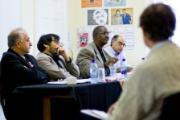
Reinvigorating public debate, broadening the space for public engagement, and encouraging a more nuanced understanding of the role of the intellectual in society were some of the dominant themes that emerged from the first session of the South African Humanities Deans’ Association (SAHDA) colloquium that was hosted at Rhodes University on 11 November.
Rhodes University Vice-Chancellor, Dr Saleem Badat opened the colloquium. He said the colloquium provided the opportunity to consider the continuities and discontinuities within the humanities and civil society and to debate the state of the humanities in South Africa.
The colloquium’s first session, ‘The Intellectual in Society’ was chaired by Professor Fred Hendricks, Dean of Humanities at Rhodes University and included panellists Dr Barney Pityana, former Unisa Vice-Chancellor and Dr Steven Friedman, Director of the Centre for the Study of Democracy at Rhodes University and the University of Johannesburg.
Highlighting a pervasive lack of social cohesion and issues of increasing and prevailing inequality, with health, education and homelessness “leaving large amounts of citizens in want and need and suffering” Dr Pityana questioned the lack of broad based rebellion.
Having recently returned from a visiting professorship in Australia, Dr Pityana said he was struck by the “excessively aggressive behaviour of South Africans”. “The level of aggression in South Africa is one that shocks me. Of even greater concern is the privileging of mediocrity,” he added.
In light of the various initiatives launched against the media, which Dr Pityana, a vocal supporter of the Right to Know campaign, said “are enough to cause an uproar”, the extent of levels of statism in the private sector, the failure of the economic system, increasing levels of insecurity, crime and corruption in society, and an archaic electoral system which according to Dr Pityana “benefits the status quo and leaves millions of South Africans disenfranchised.
“We know that South Africans are not content, but South Africans as a people are not in revolt. We haven’t seen anything of a sense of crisis in government,” he said, adding that despite excessive racism, “South Africans are by and large quiet.”
Referring to feminist critiques of constitutionalism as proposed by political philosopher Hannah Arendt, Dr Pityana suggested that the extent to which struggle credentials are implored to justify questionable political action, is undermining the relevance of the constitution, adding that “the constitution is fast becoming irrelevant as a barometer for societal values.”
Rather than relying so heavily on constitutionalism so that when the constitution collapses, which Dr Pityana believes it is, “we’ve got nothing else to hang on to”, he suggested South Africans attempt to negotiate the idea of democracy as an evolving idea, a quest which he called on universities to encourage and facilitate.
“The university is the engine of intellectual production. We need ideas that challenge and move one to revolt and spur one into action, ideas that nurture idealism so idealism doesn’t become a dirty word, ideas that fascinate people,” he said.
Continuing with an exploration of the relevance of the intellectual in society, Dr Friedman considered the tension between the intellectual’s engagement with society which should be based on intellectual rigour, and a willingness to accept a different set of disciplines to those of the academy, in considering how intellectuals can contribute to public discussion in a manner which does not compromise rigour.
Alluding to the inherent and necessary tension in intellectual activity, that “even the most secluded among us would suggest that what we do is important”, Dr Friedman said intellectuals only serve society “by doing what we do well”, and that in order for this to happen intellectuals need the latitude to do it.
Providing an overview of the current contribution of intellectuals to public discussion, Dr Friedman suggested that “what intellectuals do in government and society is a profound degradation of what we are meant to do.”
Suggesting the current complexity of the debate of the role of the intellectual in society as compared with pre-1994, “when it would have been quite a simple debate requiring a commitment to the destruction of apartheid”, Dr Friedman said many intellectuals prior to 1994 had made the mistake of believing that the end of apartheid meant the end of popular struggles. This has lead to disillusionment with the current political and socio-economic landscape.
“Given the monumental nature of the struggle intellectuals very often express great pain and anguish that the ideal people we supported haven’t turned out to be progressive human beings. Some of us never thought they were,” he said, adding that a more nuanced reading of the role of the intellectual in society is needed.
Challenging the assumption that intellectuals have moved from opposing the social order to supporting the regime, which he described as a simplistic misreading, Dr Friedman called for a more critical analysis of the role of the intellectual in society.
Highlighting three ways that intellectuals engage with society post-1994, including through engagement with government, participation in national debate and engagement with social movements, Dr Friedman suggested concerns that should preoccupy intellectuals. These included encouraging new voices and ideas within higher education institutions, increasing democratic representation of intellectuals and academics within the humanities and taking grassroots views of society more seriously.
Suggesting the need to broaden public debate and the space for public engagement to incorporate South Africans who are being excluded, as much as 70 percent of the populace according to Dr Friedman is necessary if democratic transformation is to be achieved.
The colloquium was funded by the Harold Wolpe Memorial Trust.
By Sarah-Jane Bradfield
Photo by Adrian Frost
